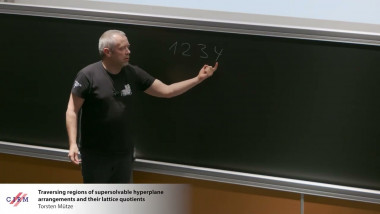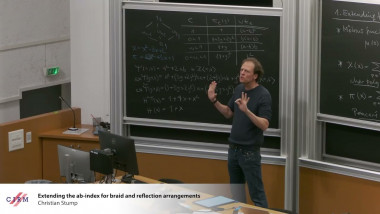
Traversing regions of supersolvable hyperplane arrangements and their lattice quotients
De Torsten Mütze

Extending the ab-index for braid and reflection arrangements
De Christian Stump
Apparaît dans la collection : 2021 - French computer algebra days / Journées nationales de calcul formel
Algebraic combinatorics studies combinatorial objects with an algebraic point of view, and conversely. As such, it is also a very fertile ground for experimental mathematics, involving both classical and new algorithms. I will discuss two topics: finite partially ordered sets and their invariants, and tree-indexed polynomials and power series. Finite partially ordered sets are discrete objects, that can be seen as directed graphs, but also possess an interesting representation theory. This leads to many difficult questions about a subtle equivalence relation, namely posets having equivalent derived categories. The theme of tree-indexed series, which can be traced back to Cayley, plays a role in the study of vector fields and ordinary differential equations. It is nowadays better understood in the framework of operads and can be considered as a nonassociative version of the study of alphabets, words and languages. Surprisingly maybe, rooted trees also appear in the study of iterated integrals, stemming out of the usual "integration-by-part" rule. I will describe the corresponding notions of algebras, without diving too much into the theory of operads. On the way, I will discuss some of the involved algorithms and their implementations.
